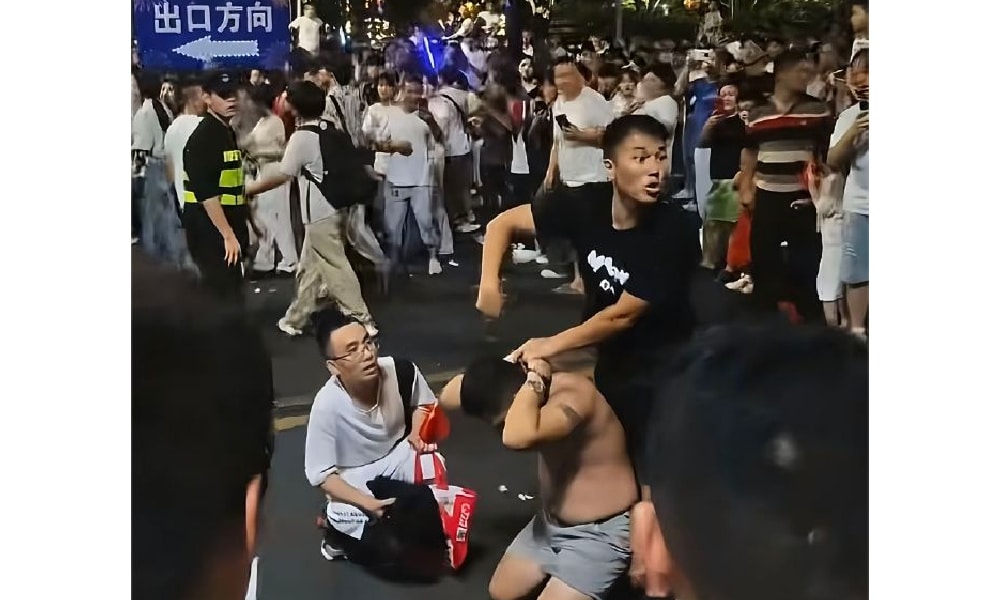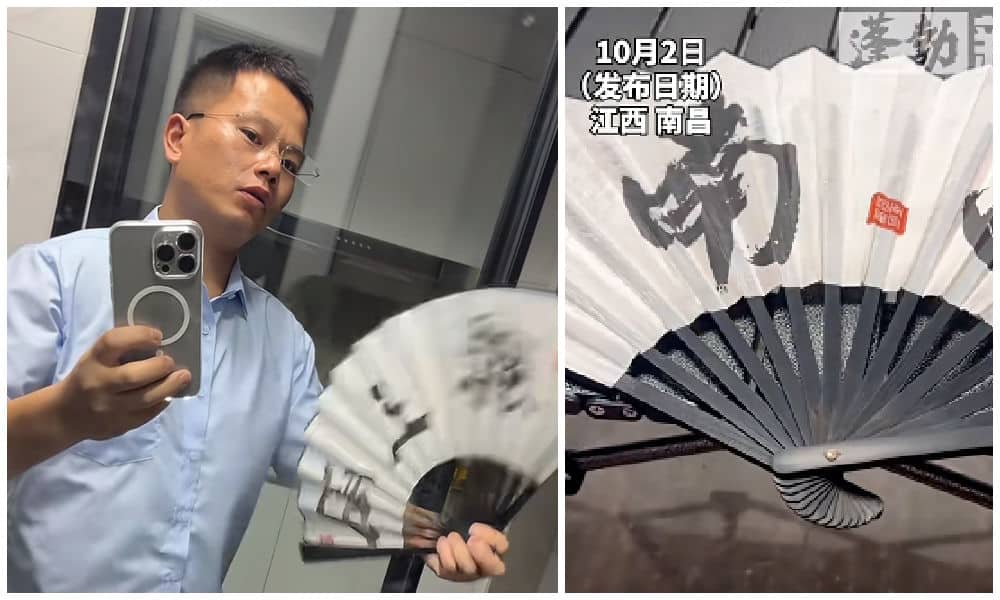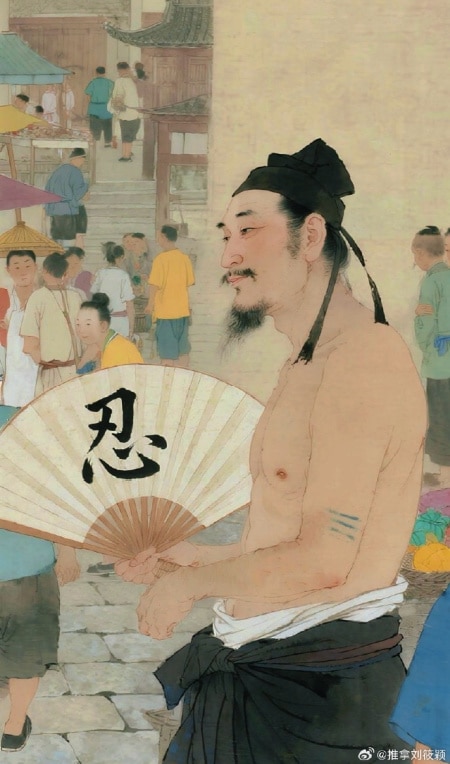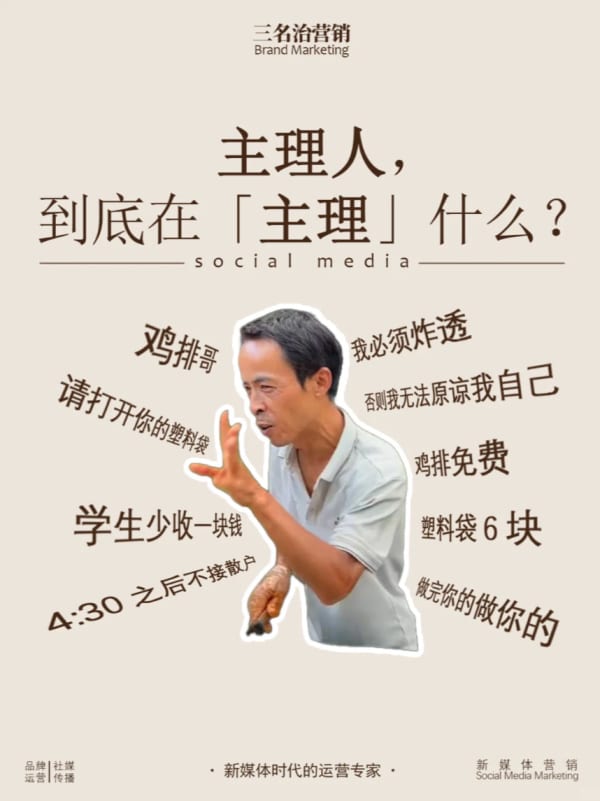China Society
The Trending Controversy Behind an Extraordinary Mount Everest Rescue
Chinese social media played a significant role in shaping the outcome of this incredible Mount Everest story.
Published
2 years agoon

The extraordinary nighttime rescue of a female Chinese mountain climber at the treacherous altitude of 8000 meters on Mount Everest was already a notable news story in its own right. However, when it was revealed that the woman declined to assume the full US$10,000 rescue fee, the story quickly spread across Chinese social media platforms, sparking fervent discussions on courage and (in)gratitude.
Recently, the news of two Chinese mountain climbers giving up on their dream to reach the summit of Mount Everest in order to rescue a female climber in distress has garnered widespread attention.
What initially seemed like a heartwarming tale of heroism quickly sparked intense debate when the 50-year-old Chinese woman refused to fully compensate her rescuers.
This incident has ignited discussions among netizens, covering financial concerns, moral responsibilities, and the notion that no good deed goes unpunished.
Sacrificing a Costly Dream
On May 18th in Nepal, at an altitude of 7,950 meters, four members of the Hunan Mountaineering Team (湖南登山队) embarked on their journey from the C4 camp on the southern slope of Mount Everest with the goal of reaching the summit.
At approximately 20:30, team leader Fan Jiangtao (范江涛) spotted a Chinese female climber huddled on the roadside at an altitude of 8,450 meters. The woman’s clothes were severely torn, one hand was exposed and blackened, and her face was coated with a thin layer of ice.
The woman seemingly undertook her climb without the aid of a Sherpa, who are typically experienced mountain guides and partners of climbers, belonging to the Nepalese ethnic group. They provide guidance and support to climbers during their ascent to different camps and, ultimately, the summit.
At an altitude of 8,000 meters on Mount Everest lies the treacherous “death zone,” where rescuing others can endanger the lives of the rescuers.
Despite initially intending to proceed with their ascent, Fan made the courageous decision to rescue the woman anyway. Along the way, he encountered another team member, Xie Ruxiang (谢如祥).
Luckily, Xie’s Sherpa guide was strong, and in order to convince the guide, Xie promised a reward of $10,000 if the Sherpa could safely bring the survivor back to the camp. Through the collective efforts of multiple individuals, including the determined Sherpa, they successfully brought Ms. Liu, who was in grave danger, back to the C4 camp.

A photo of the mountain climbers rescuing Ms. Liu, source: Beijing Evening News.
Consequently, the two rescuers had to relinquish their long-held dream to reach the summit of the Mount Everest during this significant year, which marks the 70th anniversary of the first human ascent. Not only was reaching the summit at this particular time of great importance to the mountain climbers, they also spent approximately 400,000 yuan (around US$57,000) in preparation and training fees.
Mountain of Wealth?
As the Mount Everest rescue story gained attention on Chinese social media after Hunan media outlets reported it, news emerged on June 3rd that the rescued woman allegedly intended to contribute only part of the rescue fee owed to the Sherpa who had aided in her rescue.
This information was later confirmed by one of the rescuers, Fan Jiangtao. Fan revealed that the woman had given a tip of merely $1,500 to the Sherpas, while other members of the team gave $1,800. Additionally, she expressed willingness to pay only $4,000 of the total $10,000 rescue fee.
“This angered me, and I informed her that if she maintained this attitude, I did not want any of that money, and she need not give it to me,” stated Fan. Consequently, Fan and the other rescuer, Xie, ended up paying the $10,000 fee themselves.

Fan Jiangtao (left) and Xie Ruxiang (right) after rescuing Liu, source: Beijing Evening News
As the hashtag “Woman Rescued on Everest Does not Want to Pay the Full Rescue Fee” (#珠峰被救女子不愿支付全部救援费用#) received over 370 million views on Weibo, the story ignited a fierce online debate.
While some netizens argued against criticizing Ms. Liu without knowing the full context of her personal financial circumstances, many others condemned her, stating that financial constraints should not serve as an excuse for individuals engaging in such mountain climbing endeavors, especially on Mount Everest.
Several Weibo users discussed how climbing Mount Everest would require a minimum budget of at least 500,000 yuan (approximately US$70,000) to cover expenses such as climbing permits, gear, guides, flights, not to mention the necessary training and preparation time.
Considering the widely acknowledged high costs associated with climbing Mount Everest, including rescue fees, many contend that Ms. Liu’s refusal extends beyond a mere financial issue. Additionally, most commenters suggest that Liu should not impose the burden of her rescue expenses on the rescuers.
One Weibo user expressed, “[If I were her], even if it meant going bankrupt, I would still borrow money to cover the training and preparation fees of those two rescuers [due to their failed summit attempt], let alone $10,000!”
The Farmer and the Snake
After the media exposed Ms. Liu’s refusal to pay the full amount, the two rescuers made an appeal to netizens, urging them not to engage in online harassment towards the rescued woman. They emphasized: “Rescuing people is our duty, and whether or not she expresses gratitude is her own choice. These are two completely separate matters.”
However, many argued that their critical remarks about Liu were not to be equated with ‘online harassment,’ asserting that individuals should face consequences for their actions.
Some Chinese social media users also suggested that individuals displaying ingratitude like this are unworthy of being rescued. They drew parallels to the well-known Chinese fable of “the farmer and the snake” (农夫与蛇, nóngfū yǔ shé), where a compassionate farmer saves a freezing snake during a cold winter, only to be bitten and killed by it later on. People argue that no good deed goes unpunished and also use the idiom “it’s hard to be a good person” (好人难做, hǎo rén nán zuò).

The farmer and the snake, image via Sohu.com
Liu was also labeled as a “white-eyed wolf” (白眼狼, bái yǎn láng), a term used to describe someone particularly heartless and cruel. One Weibo user commented, “We should collectively raise money to send her back to the mountain.”
Concerns were also raised that this incident might have implications for future rescues involving climbers in distress, as it could make other climbers more hesitant to come to the aid of those in need.
Various state media outlets, including Nanfang Daily (南方日报) and Hongxing News (红星新闻), urged the woman to take responsibility and acknowledge the heroic actions of the rescuers. By emphasizing the importance of not discouraging selfless acts like this, the story continued to generate online discussions, with netizens actively putting more pressure on the case.
More to the Story
On June 10, there was a somewhat unexpected follow-up to the story. As reported by NBD.com and other Chinese media outlets, Ms. Liu traveled to Changsha on June 7th to personally meet her rescuers and thank them for what they did for her.
In an in-depth article titled “They Gave up Reaching the Mount Everest Summit to Save Someone: Why Did the Rescued Person ‘Not Thank Them’ and ‘Not Pay Her Rescuers’?” (“他们放弃登顶珠峰救人:被救者为何“不感谢”“不付救援费?”), the Chinese magazine Sanlian Lifeweek (三联生活周刊) shared additional details about the entire incident, addressing some lingering questions.
According to the article, Ms. Liu arrived in Kathmandu on May 6th this year. Just 13 days later, she was found in a perilous situation, struggling for her life during her Mt Everest summit. This short time frame between her arrival and summit is highly unusual, as the usual preparation, climbing, and acclimatization period takes around 40 days.
Ms. Liu had registered with the Chengdu-based Kaitu Mountaineering company (成都凯途高山户外运动有限责任公司) to climb Mount Everest and paid them 400,000 yuan (US$56,110) for the expedition. The woman had allegedly spent all her savings to fulfill her dream of climbing Mount Everest.
As an experienced cross-country runner, the 50-year-old woman was in good physical condition and had undergone prior training for the expedition. Interestingly, she was also part of the same mountaineering team as her rescuers Fan and Xie.
Before commencing her journey, Ms. Liu discussed her climbing plans with the team leader of the company. Despite informing them that she needed to complete the summit and descent within just 20 days because her employer at a state-owned company would not allow a longer abscence, she was assured it was feasible. Normally, an Everest expedition takes about two months.
Although Ms. Liu embarked on the mountain separately from the other team members from Hunan, she had a Sherpa accompanying her. However, due to unfortunate circumstances and miscommunication, she found herself stranded and exhausted at an altitude of approximately 8000 meters, with limited oxygen, before being discovered by Fan Jiangtao at 20:30 on May 18th.

The difficult rescue of Liu took place after dark, image via Sohu.com.
Liu’s Sherpa had apparently signalled the need to return to the C4 camp for boiled water, and Liu couldn’t communicate her physical exhaustion and desire for him to stay. She then found that she was unable to detach herself from the rope due to the locking mechanism of the carabiner getting stuck, rendering her immobile.
Fan and later Xie never expected to find their team member on the mountain, assuming she had withdrawn from the expedition long ago upon learning that her job wouldn’t allow her to be away for 40 days. Without Fan and Xie, Liu’s life would have been lost on the mountain.
The Sanlian Lifeweek article doesn’t feature an interview with Liu herself but emphasizes that she is not a wealthy person and works an office job. It also highlights her introverted nature, which might have contributed to the perception of her being ungrateful.
During her visit to Changsha on June 7th, Liu finally had dinner with Fan Jiangtao, Xie Ruxiang, and several other team members to address mixed emotions and misunderstandings after her rescue. Allegedly, she also brought US$10,000 and an additional 20,000 yuan ($2800) to give to Fan and Xie, although they declined the offer.
Meanwhile, the Chengdu-based Kaitu Mountaineering company has now stepped forward and declared their commitment to bearing the financial burden of Liu’s rescue. They acknowledge the role they played, along with their Sherpa, in contributing to Liu’s predicament.
In a statement released on June 10, the company expressed gratitude towards the rescue team and announced that they had reached an agreement with the rescuers, the Sherpa rescue team, and Ms. Liu regarding the coverage of expenses (#珠峰被救女子所雇登山公司发文#).
Despite understanding the complete story, many netizens still express their inability to comprehend why Liu didn’t come forward earlier to cover the entire amount.
Others also think that being an introverted person has nothing to do with not being able to properly express gratitude for someone saving your life.
And then there are also those who are happy with the current outcome and the role played by social media in pressuring the responsible parties to provide financial compensation: “Without the internet, this never would have happened.”
By Zilan Qian and Manya Koetse
Get the story behind the hashtag. Subscribe to What’s on Weibo here to receive our newsletter and get access to our latest articles:
Spotted a mistake or want to add something? Please let us know in comments below or email us. First-time commenters, please be patient – we will have to manually approve your comment before it appears.
©2023 Whatsonweibo. All rights reserved. Do not reproduce our content without permission – you can contact us at info@whatsonweibo.com.
Stories that are authored by the What's on Weibo Team are the stories that multiple authors contributed to. Please check the names at the end of the articles to see who the authors are.

You may like
China Memes & Viral
Nanchang Crowd Confuses Fan for Knife — Man Kicked Down and Taken Away
An unfortunate misunderstanding led to one innocent man being the only person injured in a crowd of thousands.
Published
1 week agoon
October 5, 2025
On the evening of October 1st, National Day and the start of a week-long holiday, Nanchang was celebrating with a spectacular fireworks/drone show, drawing an enormous crowd of people (see video).
But the fireworks weren’t the only thing drawing attention. One man on Nanchang’s crowded Shimao Road caught bystanders’ eyes.
He was shirtless, strongly built with a visible tattoo, and was waving a pointed object while loudly shouting something that sounded like, “I’ll kill you! I’ll kill you!”
At first, the people around him seemed unsure of what to do, keeping their distance and too afraid to approach. A large crowd formed but stayed back.
Then, a brave young man in red rushed forward and snatched the pointed object from his hand, while another young man leapt in with a flying kick that knocked him to the ground.

Several others then joined in, working together to restrain the man, as onlookers surrounded the scene and held him there until police arrived and took him to the station.
Soon, videos of the incident spread online (see video here), and rumors quickly surfaced that the man had been trying to attack people with a knife.

But that all turned out to be one major misunderstanding.
The next day, local police clarified what had actually happened, followed by an explanation from the man himself.
The man in question, a 31-year-old local second-hand car dealer named Li, had come to see the fireworks together with his family, including his sisters and three nephews.
Because of the very hot weather, he had taken off his shirt and was cooling himself with a 10-yuan folding fan he had just bought along the way.
After the show, while walking back, Li realized one of his nephews was missing and searched for him, calling out in his local dialect: “Where’s my kid? Where’s my kid?” (“我崽尼 我崽尼” wǒ zǎi ní).
Bystanders misheard this as “我宰你 我宰你” (wǒ zǎi nǐ, wǒ zǎi nǐ, “I’ll kill you, I’ll kill you”) and mistook his folding fan for a machete.
Meanwhile, Li couldn’t understand why people around him were avoiding him and keeping their distance from him while he was searching for his nephew (see that moment here, also see more footage here). People were watching him, and recording the scene from a distance.
Before Li realized what was happening, the fan was snatched from his hands and he was violently kicked. A crowd swarmed him, beat him, and pushed him to the ground.
The police then detained him, and it wasn’t until the early hours of October 2, after thorough questioning, that he was finally released.
“I’m still confused about it,” Li said the next day. Holding the fan up to the camera, he asked: “Can a fan like this really scare people? I don’t understand — I just got beaten for nothing.”

Mr Li in his video, showing the fan he bought for 10RMB/$1.4 at the Nanchang fireworks.
Some commenters remarked that out of the 1.2 million people who were out in Nanchang that night, he was the only one injured.
Li seems to be doing ok apart from a sore backside and a puzzled mind, and his nephew apparently is also safe and well.
The bizarre misunderstanding has sparked widespread banter online, with people now referring to Li as “Nanchang Brother Fan” (南昌扇子哥).
“I’m dying of laughter. It’s both tragic and hilarious,” one Douyin user wrote, while others simply called the situation “so drama” (抓马 zhuāmǎ): “I’m not supposed to laugh, but I can’t help it.”
Some also noted that they understood why people at the scene mistook Li for a criminal: “At night, a guy with tattoos, holding a long stick-like object, shouting loudly all the way, what would you think?”
All joking aside, the public’s response on such a crowded night — when so many people gathered together, potentially making a tempting target for those with bad intentions — shows a heightened sense of vigilance. Unlike the U.S., where gun violence is more common, shootings are rare in China. But random stabbings have increasingly made headlines.
For Nanchang in particular, a stabbing incident that shocked the nation had taken place only weeks earlier: a 19-year-old woman was attacked and stabbed more than ten times by a 23-year-old man she did not know, and later died from her injuries.
But there have also been other recent cases, from Wuhan to Leiyang. And in 2024 especially, a spate of stabbing incidents shocked the country. In Wuxi, Jiangsu Province, a mass stabbing left eight people dead and 17 others injured.
The positive takeaway from this entire mix-up is that the quick action of the crowd — despite their wrong assessment of the situation — shows that people weren’t afraid to step in for the sake of public safety.
But others claim the exact opposite is true. Illustrator and commentator ‘Wu Zhiru’ (吴之如), former editor at Zhenjiang Daily, saw the incident as an example of toxic herd mentality. He posted an illustration of a fan being held up with the characters 清风徐来 (qīng fēng xú lái, “a cool breeze slowly blows”), an idiom to describe a pleasant atmosphere. A finger from the right points at the fan-holder, saying “Look, he’s gonna commit violence!” (“哇,他要行凶啦!”)

Wu Zhiru warns against panic-driven mob mentality and wonders why the first man, who snatched the “knife” from Li’s hands, did not stop the crowd from attacking Li as soon as he discovered that he had snatched away a fan and not a blade. Drawing historical parallels to the Cultural Revolution, Wu argues that people are sometimes so set on doing the “heroic” thing that they hesitate to correct misunderstandings once better information is available — a mindset that can lead to serious, harmful consequences.
For Li himself, despite the unfortunate night he had, the situation has actually brought him some unexpected fame and extra attention for his second-hand car dealership, which undoubtedly makes his boss happy (in a very recent livestream, Li was praised for being kind and loyal).
Many netizens also argued that the real lesson to draw from this ordeal is the importance of speaking proper standard Chinese. Some even framed the incident as “The Importance of Mandarin” (论普通话的重要性), pointing out that the whole problem began because Li was misunderstood while speaking dialect.

Image posted on Weibo in support of the “fan-waving brother.” The character on the fan says “tolerate.”
Others joked that the misunderstanding was just a grave injustice to shirtless men everywhere, writing: “From now on, the world has one less sincere guy who goes shirtless in the streets. He’ll never be the same again.”
By Manya Koetse
(follow on X, LinkedIn, or Instagram)
Spotted a mistake or want to add something? Please let us know in comments below or email us. First-time commenters, please be patient – we will have to manually approve your comment before it appears.
©2025 Whatsonweibo. All rights reserved. Do not reproduce our content without permission – you can contact us at info@whatsonweibo.com.
China Memes & Viral
China’s National Day Holiday Hit: Jingdezhen’s “Chicken Chop Bro”
From viral street food vendors to China’s donkey crisis and new eldercare services, here’s this week’s Weibo highlights in What’s on Weibo’s China Trend Watch.
Published
2 weeks agoon
September 30, 2025
🔥 What’s Trending in China This Week? Stay updated with China Trend Watch by What’s on Weibo — your quick overview of what’s trending on Weibo and across other Chinese social media, curated by Manya Koetse.
What’s inside:
- 1. Jingdezhen’s “Chicken Chop Bro” Becomes Nationwide Meme
- 2. China’s 2025 Golden Week Travel Trends
- 3. China Faces Donkey Shortage Crisis
- 4. Word of the Week: “Ride-hailing for Relatives” 亲属打车 Qīnshǔ Dǎchē
- 5. What’s Inside at a Glance
1. Jingdezhen’s “Chicken Chop Bro” Becomes Nationwide Meme
From Beijing to Zibo, every now and then, food stall vendors go viral — for their charm, their uniqueness, and most of all, their tasty food. The star of this moment is 48-year-old Li Junyong (李俊永), who runs a small fried chicken stall in Jingdezhen, Jiangxi Province, with tight rules on who he serves, when, and how.
Li has suddenly become one of the most trending people on Chinese social media under the nickname “Chicken Chop Brother” (鸡排哥 jīpáigē).
Li initially gained popularity among customers for his frantic, multitasking energy — he doesn’t mess around when it comes to his chicken chop business, with superspeed and a clear order of serving customers (“I’ll first do you, then finish yours, then I’ll serve you 做完你的做你的”) and rules such as: no individual customers after 4:30 PM; students pay 1 yuan (about $0.15) less than regular passersby (after 12:00 PM, however, it costs 1 yuan more as punishment for being indecisive); and customers must open the plastic bag themselves before he puts the hot chicken cutlet inside.
The serious way he goes about dealing with his chicken chops almost makes you think he was making big business deals instead of selling to middle school students. In the end, it’s that attitude that gained him social media fame, as students started referring to him as “Head of Chicken Cutlet Operations” (free translation for 鸡排主理人 Jīpái gē Zhǔlǐrén).

Head of Chicken Chop Operations: “Please open your plastic bag”, “No individual customers after 4:30 PM”, etc.
In light of Li’s explosive popularity, his chicken chop stall now sees extremely long queues, and local authorities and city management have had to intervene in order to control the crowds and keep the location safe.
There are definite downsides to such sudden fame, and Li is not the first street vendor this has happened to.
In 2023, for example, Beijing’s ‘Auntie Goose Legs’ (鹅腿阿姨) went viral, and the food stall owner became so overwhelmed that she temporarily had to take a break from her food stall, emotionally sharing how she said she felt too much pressure because of how the situation was unfolding, and that she just wanted to sell her goose legs in peace (“只想平平安安做烧烤”).

Long lines for Auntie’s goose legs.
It seems that “Brother Chicken Chops”, in line with his reputation as the chicken chop CEO, is trying to turn his viral moment into a sustainable business. According to Sina News, Li has drawn in relatives to help him. He reportedly has taught them how to make and sell his tasty fried chicken chops, and now his Chicken Chop Family (“鸡排家族”) has grown to a total of nine stalls.
Over the past week, Li has also joined several social media platforms, including Xiaohongshu, to build a social following that will last after the hype calms down.
Meanwhile, Li is the meme of the moment. As many Chinese workers experience working stress before the National Day holiday, they’ve used his superspeed working style videos to express the pressure they feel to finish all their deadlines. See videos here.
— What Else Is Trending —
2. China’s 2025 Golden Week Travel Trends

China’s longest holiday of 2025 is coming up, combining National Day (国庆节) and Mid-Autumn Festival (中秋节) into an eight-day Golden Week from October 1–8. If you’re traveling in China this week, good luck — the country’s transportation infrastructure is being pushed to its operational limits.
On September 30, the first “smart people” who opted to leave early to avoid traffic jams already found themselves stuck in them. China’s Ministry of Transport estimates a staggering 2.36 billion trips will be made during this period, with October 1 expected to see over 340 million travelers — surpassing the historical peak of 339 million recorded during Spring Festival earlier this year.
🔸 This week is going to see a lot of events. According to the Ministry of Culture & Tourism, more than 12,000 cultural activities will be held across China during the eight-day holiday period, including over 300 large-scale light shows.
🔸 Chinese local tourism offices are going all in on city marketing and are finding new strategies to make themselves more appealing to young travelers. Chengdu, for example, as Tencent’s gaming hub, is integrating the 10th anniversary of the super popular mobile game Honor of Kings (王者荣耀, Wángzhě Róngyào) into its cultural tourism strategy this year, organizing game-themed city walks, exhibitions, and more.
🔸 China’s travel platform Trip.com reported that interprovincial travel bookings have surged 45% year-on-year, with particularly strong interest in remote destinations like Xinjiang, Tibet, and Inner Mongolia. Searches for hotels in these regions jumped 60% compared to last year. This reflects a shift among middle-class Chinese tourists toward experiential travel and natural landscapes rather than crowded urban attractions.
🔸 The holidays are a time for relaxation, reunions, and eating mooncakes, but it’s also a stressful time for Chinese employers who must comply with labor regulations while managing workforce availability and overtime obligations. Under China’s Labor Law, employees working on statutory public holidays—October 1–3 and October 6 (the official Mid-Autumn Festival date)—must receive at least 300% of their normal daily wage. For adjusted rest days (October 4–5 and October 7–8), employers must provide either 200% overtime pay or compensatory time off. The State Council designated September 28 (Sunday) and October 11 (Saturday) as make-up workdays, but private companies have flexibility to adjust their own schedules.
3. China Faces Unprecedented Donkey Shortage Crisis

China is facing a serious donkey shortage. China’s donkey population is far below market demand, and the prices of donkey-related products continue to rise. The Donkey Branch of China’s Livestock Association (中国畜牧业协会驴业分会) addressed this issue in Chinese media earlier last week, telling China News Weekly (中国新闻周刊): “We have plenty of cattle and horses in China now — just not enough donkeys” (“目前我国牛马都不缺,就缺驴”).
4. “Ride-hailing for Relatives” 亲属打车 Qīnshǔ Dǎchē

Tencent has rolled out a new function via WeChat Mini Programs on September 26, aimed at helping seniors who struggle with app-based ride-hailing. Thanks to the new function, now live nationwide, users can order rides on behalf of older relatives directly in WeChat.
Adult children who want to help out their less tech-savvy (grand)parents or other senior relatives can now bind their account to their own, remotely pre-set pickup and drop-off locations, as well as payment methods, and track their journey for safety.
What makes this different from the possibility of just ordering a ride for someone else is that the seniors stay in control to some extent and can see their own journeys on their own phones. Children can configure settings on their side, while the interface for the elderly users is simplified. This allows seniors to ride independently, with a little help from their family.
The move is part of a broader effort in China to make it easier for seniors to stay involved in the digitalization of society.
The word to know is 亲属打车 qīnshǔ dǎchē, consisting of “亲属” qīnshǔ (relatives) and ride-hailing 打车 dǎchē.
5. What’s Trending at a Glance
- ✈️ The 27-year-old Sichuan creator “Tang Feiji” (唐飞机) died in a plane crash while livestreaming on Sept 27. The ultralight aircraft, piloted and purchased by Tang himself, went out of control and crashed before catching fire. Over 1,000 viewers were watching live, with the chat flooded by messages pleading for someone to rescue him. Local village officials confirmed his death. The tragedy is fueling debate over amateur aviation and extreme content creation.
- 🟢 Weibo has rolled out a visible “online status” feature on personal pages, showing when users are online, and not everyone is happy with it. The new feature is met with criticism from concerned users who don’t want others to see they’re online. It brings back memories of China’s legendary IM app QQ, which, like MSN, showed the online status of users.
- 🥿 A Chinese Marriott hotel location in Changzhou has come under scrutiny adn triggered hygiene concerns after guests found out that the in-room hotel slippers were being reused. The hotel has admitted to disinfected the disposable slippers and reusing them 2–3 times, without disclosing this to guests in advance.
- ⚖️ China’s cyberspace authorities issued stern warnings and announced penalties on various Chinese social platforms recently, including Xiaohongshu, Weibo, and Kuaishou, which are blamed for not keeping celebrity gossip and low-quality content in check and for influencing their hot search rankings. This is all about algorithm governance and the tightrope platforms walk in serving readers, attracting attention, and satisfying regulators.
- 👵 “Outsourced Children” services for Chinese seniors went trending recently. In Dalian, an initiative offering companionship and mediation services for seniors charges 500–2,500 yuan ($70–$350) per visit and has apparently been quite a success, underscoring strong market demand of eldercare-related services and new opportunities for Chinese students.
By Manya Koetse
(follow on X, LinkedIn, or Instagram)
Spotted a mistake or want to add something? Please let us know in comments below or email us. First-time commenters, please be patient – we will have to manually approve your comment before it appears.
©2025 Whatsonweibo. All rights reserved. Do not reproduce our content without permission – you can contact us at info@whatsonweibo.com.
Subscribe
What’s on Weibo is a reader-supported publication, run by Manya Koetse (@manyapan), offering independent analysis of social trends in China for over a decade. To receive new posts and support our work, consider becoming a paid subscriber.

Get in touch
Would you like to become a contributor, or do you have any tips or suggestions? Get in touch here!

How the “Nexperia Incident” Became a Mirror of China–Europe Tensions

China Faces Unprecedented Donkey Shortage Crisis

Nanchang Crowd Confuses Fan for Knife — Man Kicked Down and Taken Away

The Wong Kar-wai Scandal Explained: The Dark Side of ‘Blossoms Shanghai’

China’s National Day Holiday Hit: Jingdezhen’s “Chicken Chop Bro”

Hidden Cameras and Taboo Topics: The Many Layers of the “Nanjing Sister Hong” Scandal

“Jiangyou Bullying Incident”: From Online Outrage to Offline Protest

The Rising Online Movement for Smoke-Free Public Spaces in China

China Trend Watch: Pagoda Fruit Backlash, Tiananmen Parade Drill & Alipay Outage (Aug 11–12)

From Schadenfreude to Sympathy: Chinese Online Reactions to Charlie Kirk Shooting
Popular Reads
-

 China Memes & Viral3 months ago
China Memes & Viral3 months agoHidden Cameras and Taboo Topics: The Many Layers of the “Nanjing Sister Hong” Scandal
-

 China Books & Literature12 months ago
China Books & Literature12 months agoThe Price of Writing Smut: Inside China’s Crackdown on Erotic Fiction
-

 China Insight5 months ago
China Insight5 months agoUnderstanding the Dr. Xiao Medical Scandal
-

 China Memes & Viral10 months ago
China Memes & Viral10 months agoOur Picks: Top 10 Chinese Buzzwords and Phrases of 2024 Explained



